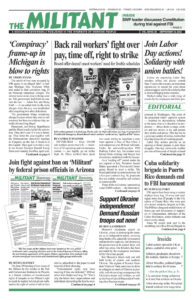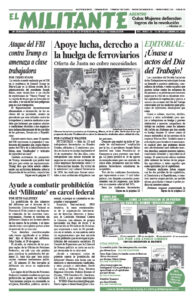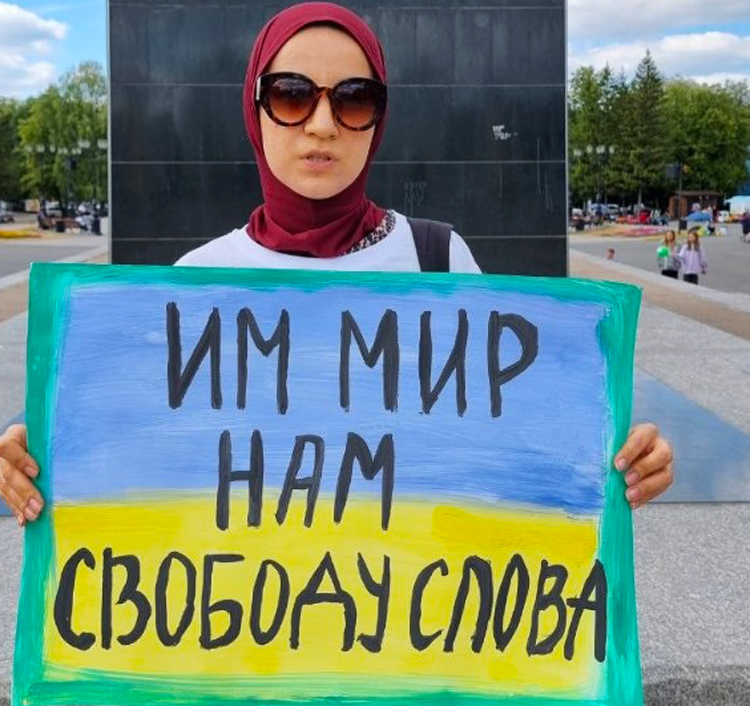Moscow’s murderous assault on Ukraine, aimed at destroying the country as an independent nation, annexing large hunks of it, especially its resources and productive capacity, and destroying the government in its capital, Kyiv, and other key cities, like Kharkiv, has been prevented by the courageous resistance of the Ukrainian people.
But Moscow’s forces took and still hold hunks of eastern and southern Ukraine. The regime of Russian President Vladimir Putin continues its drive to subjugate as much of Ukraine as possible, with devastating consequences for Ukrainian troops and civilians, as well as the lives of tens of thousands of working-class Russian troops.
Putin signed a decree Aug. 25 to expand the million-strong Russian military by over 10%. He is trying to replenish his depleted forces and demoralized ranks after a six-month conflict that Moscow expected to win within weeks if not days. He still hopes to reimpose the Russian prison house of nations that existed for centuries under the czars, with himself as the ruler.
Moscow’s relentless bombardment of industrial areas and ports in Ukraine’s southeast has cut the country’s economic production in half. The Kremlin hopes that drawn out economic and political pressures will, over time, lead to increased conflicts among and between Washington and imperialist powers in Europe, especially Berlin and Paris, and sap their resolve to back Ukraine. Moscow has further constricted its gas supplies to Europe as energy costs there are soaring.
In addition to conquering Ukraine and crushing its people, the Russian rulers hoped to seize the country’s resources, like the rich iron ore deposits and immense ArcelorMittal steel plant at Kryvyi Rih in south central Ukraine. Moscow’s forces were driven back there as Ukrainian forces reinforced by volunteer detachments of steelworkers and miners used heavy construction equipment to block airport runways and roads and dig defensive lines. Russian rockets still target the city from 30 miles away.
Moscow’s war has ensured the near-total shutdown of the steel mill and mines. Coal imports to the plant from Kazakhstan via Russian rail lines ended, while Moscow’s naval blockade of Black Sea ports prevents exports from the plant. And bosses cut wages by a third to workers there idled by the war.
Russian protests against the war
Despite the mass arrest of opponents of Putin’s war inside Russia, protests among soldiers and others continue, highlighting openings that exist to forge unity against the war among working people in Russia and Ukraine.
The Aug. 24 detention of Yevgeny Roizman, former mayor of Yekaterinburg, Russia’s fourth largest city, was met with protests by a handful of the city’s residents. Roizman was charged with “discrediting the Russian army” for stating the war was an “invasion,” and not “a special military operation” — the Putin-sanctified doublespeak for the war.
“I was saying that everywhere and I will say it now,” Roizman said defiantly after his arrest. He was released a day later, pending a trial. Courts had fined him three times for his outspoken opposition to Moscow’s war.
Elmira Rahmatullina was arrested in early August after holding a one-woman protest in Ufa, in the Volga region. She carried a placard in the colors of the Ukrainian flag that read, “Give them peace, and us, freedom of speech.”
Statements by Ukrainian leaders denouncing the entire Russian people as the enemy are a deadly obstacle to building solidarity between workers in the two countries and increasing pressure on Moscow. So are the biting sanctions imposed by Washington and other imperialist powers, which impose hardships that are overwhelmingly inflicted on working people.
Now European Union foreign ministers are debating whether to ban or restrict tourist visas to Russian citizens. Ukrainian President Volodymyr Zelensky urges them to do so. The Estonian government has barred Russians who already have visas from entering the country. The German rulers say they’re opposed to a European-wide ban.
In the early stages of the war almost a million Russians, horrified by the war and Putin’s repression, fled to Europe. Closing off this “escape route” by restricting visas would just penalize “critics of the regime” and do “the Kremlin’s work for it,” Anna Arutunyan wrote in the Moscow Times.
In early August Moscow’s forces in Russian-occupied Donbas in eastern Ukraine stepped up enforced conscription of male residents of the region. Thousands have been rounded up to be used as cannon fodder. Just prior to the invasion, pro-Moscow authorities in Donetsk and Luhansk barred working people from leaving the cities.
Since then company bosses have been ordered to provide the names of “volunteers,” under threat of conscription of entire workforces. Bosses at the Alchevsk iron and steel plant have laid off 3,600 workers, helping authorities fulfill their quotas.
Moscow has unleashed masked gangs to carry out street ambushes on those local men who had stayed home for months to try to avoid being drafted. They also raid homes at night, beating those they capture as they cart them away. Draftees are routinely thrown into the most perilous areas at the front with little training and poor equipment.
These parts of Donbas are the very regions where the Kremlin plans to hold sham referendums on “joining” the Russian Federation Sept. 14. Originally, Putin justified the Feb. 24 invasion of Ukraine days after recognizing the separatist Donetsk and Luhansk “people’s republics” as independent states.
Similar referendums in Russian-occupied Kherson and Zaporizhzhia have been postponed, given the depth of popular opposition. The Ukrainian government claimed Aug. 29 that a “grinding counteroffensive” to retake the Kherson region had begun.


